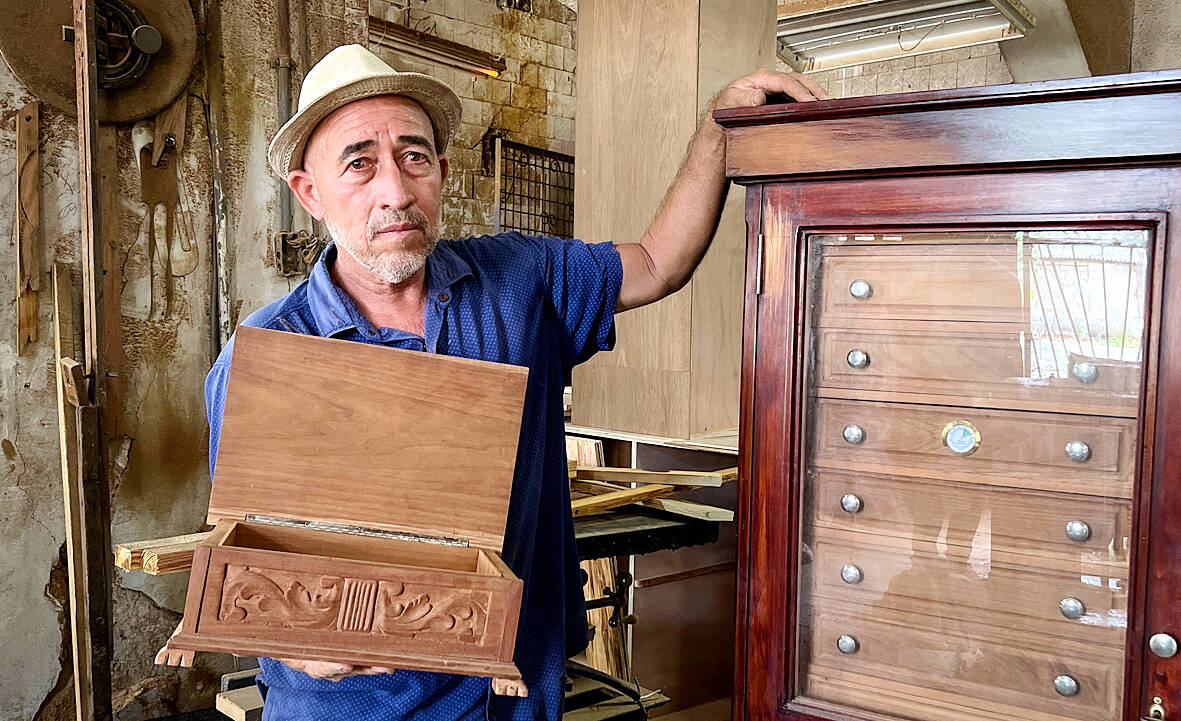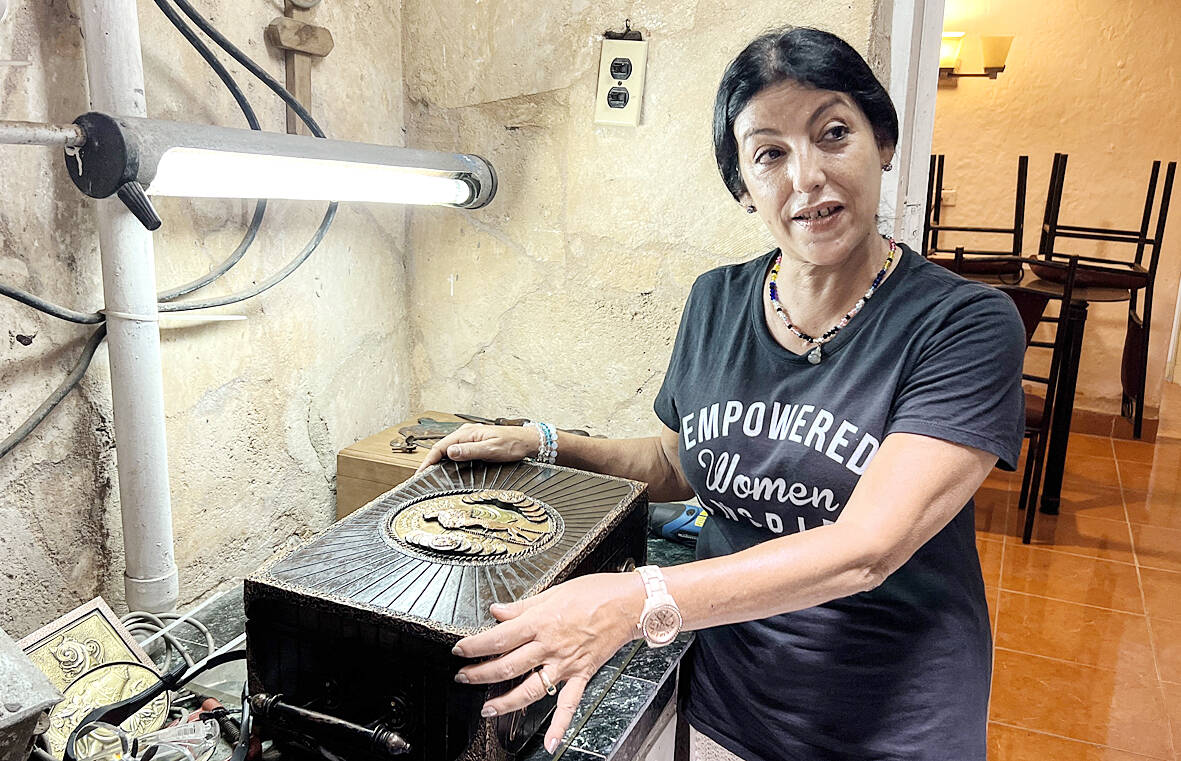Using a Soviet-era planer, Rene Reyes smooths the panel of an old cedar door that he will transform into a humidor — an ornate, handmade box used to preserve Cuba’s famous cigars. In a corner of the workshop lies a hodge-podge of discarded wooden beams, doors and furniture, all used to make the cigar boxes, which can sell for thousands of dollars and are prized by wealthy business people, rock stars and presidents.
“People don’t believe that ... these humidors come from there,” says Reyes, pointing to the pile of raw materials.
The artisan is working on the replica of a modest humidor owned by American writer Ernest Hemingway, the original of which is displayed at his former home in eastern Havana, which is now a museum.

Photo: AFP
As he brushes the door panel, which he says is over 80 years old, the warm and sweet aroma of old cedar fills the workshop.
“The smell of cedar is the best. It is as if it were gold, old gold,” Reyes gushes as he brings his hands full of sawdust to his nose.
Reyes works for businesswoman Tania Duyos, who has spent two decades designing the boxes that keep cigars at the perfect humidity of around 65 or 70 percent and a temperature of 16 to 18 degrees Celsius.

Photo: AFP
She boasts celebrity clients such as former US president Jimmy Carter, the late footballer Diego Maradona, and Rolling Stones frontman Mick Jagger.
Duyos says she also gifted one of her cigar boxes to another former US president, Barack Obama, during his historic 2016 visit to the island, and that he wrote her a thank you letter.
Cuban cigars are one of the island’s most famous exports and are considered among the finest in the world. Dozens of humidor workshops can be found across the country. Experts say a good humidor can preserve the quality of a cigar for up to 15 years, and even improve it.
Cuban artisans use several types of wood, such as mahogany or ebony, but tradition dictates that the interior must be made from old cedar.
“Cedar is very favorable” because “it protects the tobacco from bacteria and provides it with the humidity,” necessary for its conservation, Duyos says. If kept in the wrong environment, even the best cigar loses its quality.
With carved, embossed or painted designs, some of the chests are true works of art and are coveted by collectors.
While some are sold for eye-watering prices, more modest versions are also available on the local market.
Every year, the Habano Festival — dedicated to cigar enthusiasts — closes with a humidor auction.
In February, the auction of six cigar boxes raised a record US$11.9 million. The star of the show was an exquisite, circular piece, one meter deep, made of precious woods, with titanium and bronze touches.
Containing 500 of the best Cohiba cigars — the most prestigious from the island — it sold for US$4.4 million.
Duyos admits that in Cuba, which has been under American sanctions for over half a century and gripped by the worst economic crisis in 30 years, you need to adapt to shortages of glue, sealants, varnish, sandpaper or tools.
“We practically work wonders with nothing,” said Reyes. “The secret is the love” of the job.

Towering high above Taiwan’s capital city at 508 meters, Taipei 101 dominates the skyline. The earthquake-proof skyscraper of steel and glass has captured the imagination of professional rock climber Alex Honnold for more than a decade. Tomorrow morning, he will climb it in his signature free solo style — without ropes or protective equipment. And Netflix will broadcast it — live. The event’s announcement has drawn both excitement and trepidation, as well as some concerns over the ethical implications of attempting such a high-risk endeavor on live broadcast. Many have questioned Honnold’s desire to continues his free-solo climbs now that he’s a

Francis William White, an Englishman who late in the 1860s served as Commissioner of the Imperial Customs Service in Tainan, published the tale of a jaunt he took one winter in 1868: A visit to the interior of south Formosa (1870). White’s journey took him into the mountains, where he mused on the difficult terrain and the ease with which his little group could be ambushed in the crags and dense vegetation. At one point he stays at the house of a local near a stream on the border of indigenous territory: “Their matchlocks, which were kept in excellent order,

Jan. 19 to Jan. 25 In 1933, an all-star team of musicians and lyricists began shaping a new sound. The person who brought them together was Chen Chun-yu (陳君玉), head of Columbia Records’ arts department. Tasked with creating Taiwanese “pop music,” they released hit after hit that year, with Chen contributing lyrics to several of the songs himself. Many figures from that group, including composer Teng Yu-hsien (鄧雨賢), vocalist Chun-chun (純純, Sun-sun in Taiwanese) and lyricist Lee Lin-chiu (李臨秋) remain well-known today, particularly for the famous classic Longing for the Spring Breeze (望春風). Chen, however, is not a name

There is no question that Tyrannosaurus rex got big. In fact, this fearsome dinosaur may have been Earth’s most massive land predator of all time. But the question of how quickly T. rex achieved its maximum size has been a matter of debate. A new study examining bone tissue microstructure in the leg bones of 17 fossil specimens concludes that Tyrannosaurus took about 40 years to reach its maximum size of roughly 8 tons, some 15 years more than previously estimated. As part of the study, the researchers identified previously unknown growth marks in these bones that could be seen only